Change Management Consulting Report: AI, Workforce & Strategies
VerifiedAdded on 2023/06/12
|12
|3284
|107
Report
AI Summary
This report examines the implications of artificial intelligence (AI) on workforce reduction, particularly in software industries. It discusses AI's benefits, such as increased productivity and efficiency, while also addressing the negative impacts on employees with limited skills. The report analyzes the situation, highlighting the increasing investment in AI and its potential to replace manual labor. It proposes interventions, such as developing secure and user-friendly AI chips and artificial neural networks, to facilitate the integration of AI while maintaining human oversight. The report emphasizes the importance of data privacy and strategic planning for successful change management in the face of technological advancements, suggesting that AI will significantly transform the software and programming sectors in the coming decades, necessitating a balance between automation and human expertise. Desklib provides students access to a wealth of resources, including past papers and solved assignments.
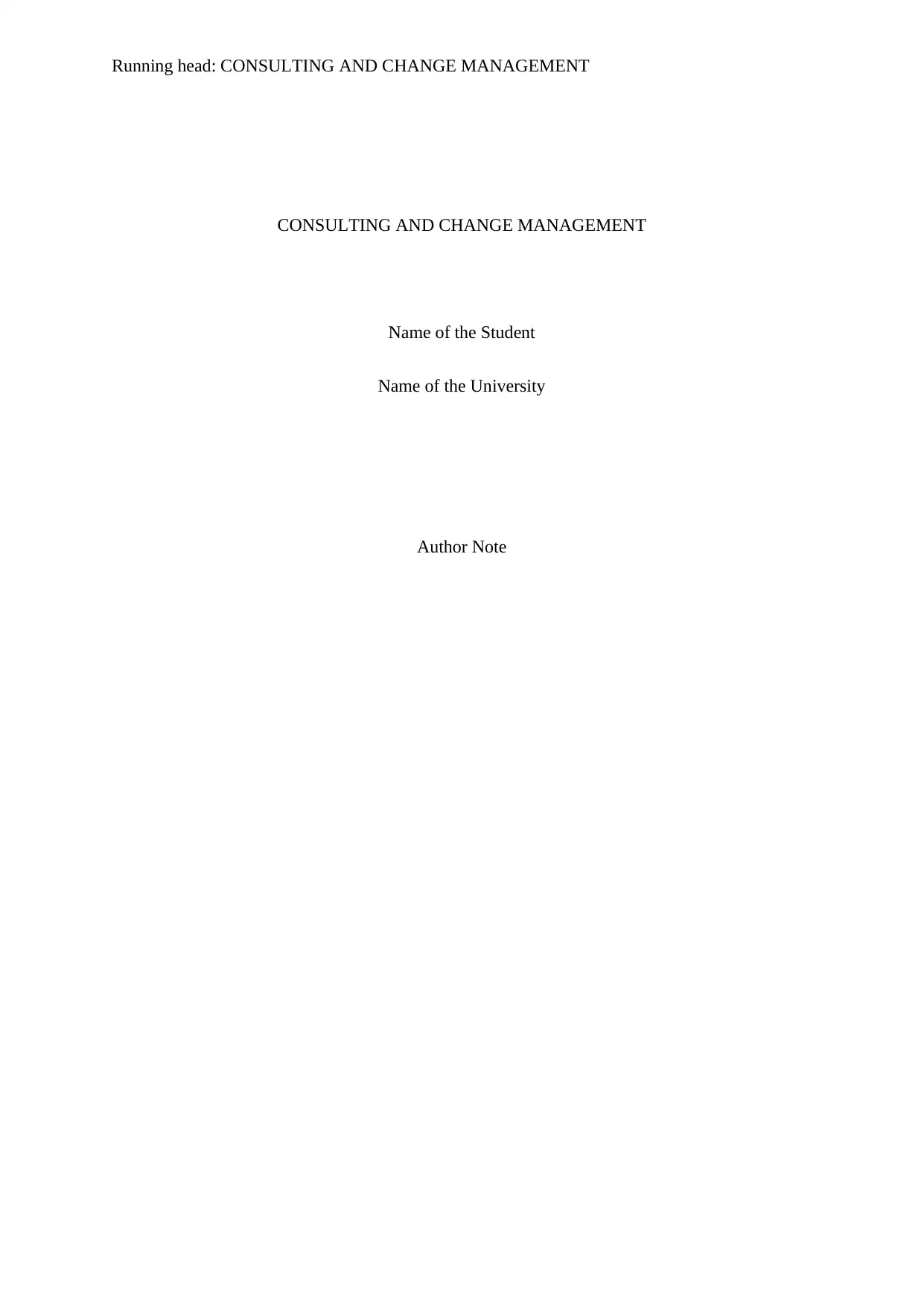
Running head: CONSULTING AND CHANGE MANAGEMENT
CONSULTING AND CHANGE MANAGEMENT
Name of the Student
Name of the University
Author Note
CONSULTING AND CHANGE MANAGEMENT
Name of the Student
Name of the University
Author Note
Paraphrase This Document
Need a fresh take? Get an instant paraphrase of this document with our AI Paraphraser
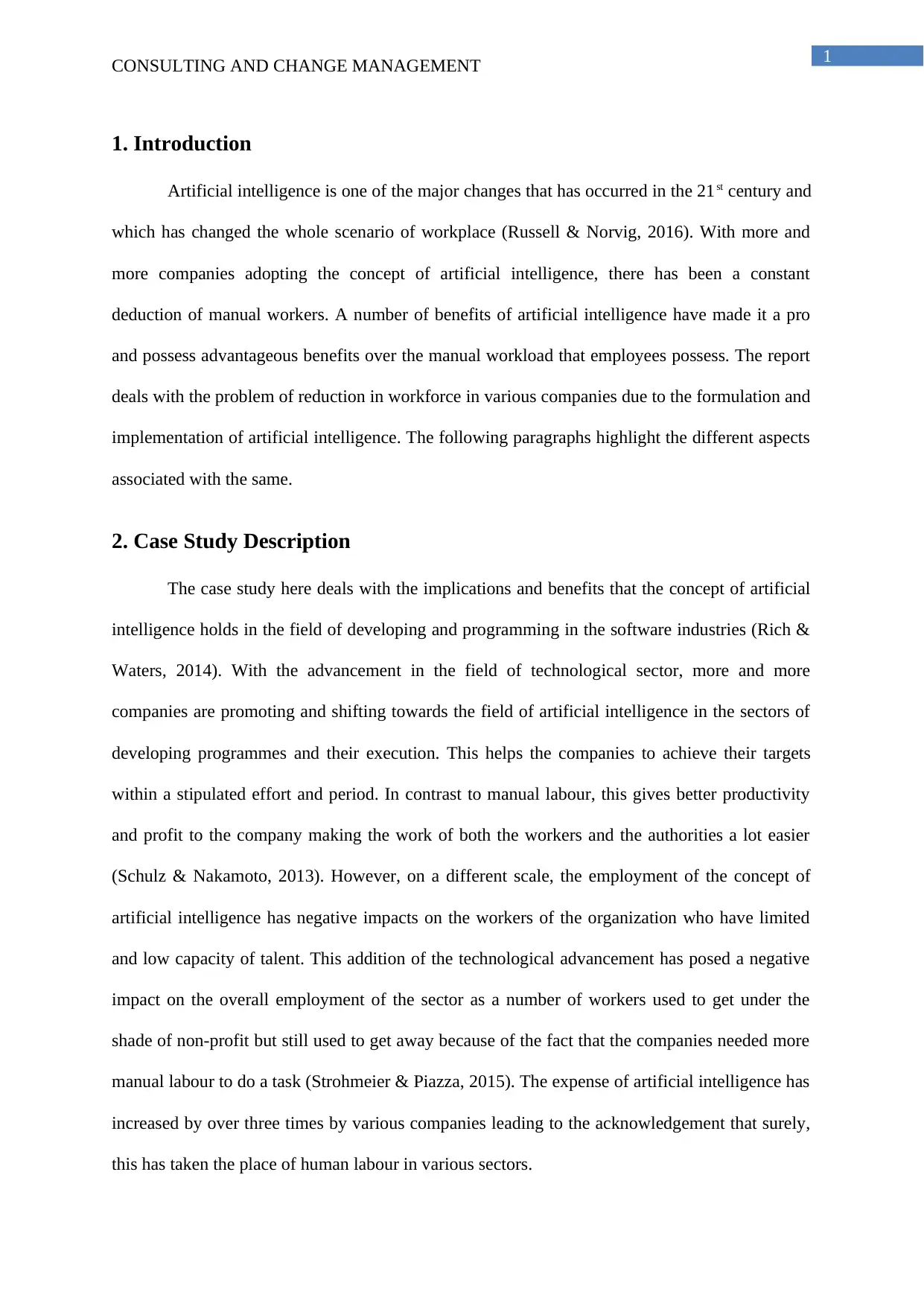
1
CONSULTING AND CHANGE MANAGEMENT
1. Introduction
Artificial intelligence is one of the major changes that has occurred in the 21st century and
which has changed the whole scenario of workplace (Russell & Norvig, 2016). With more and
more companies adopting the concept of artificial intelligence, there has been a constant
deduction of manual workers. A number of benefits of artificial intelligence have made it a pro
and possess advantageous benefits over the manual workload that employees possess. The report
deals with the problem of reduction in workforce in various companies due to the formulation and
implementation of artificial intelligence. The following paragraphs highlight the different aspects
associated with the same.
2. Case Study Description
The case study here deals with the implications and benefits that the concept of artificial
intelligence holds in the field of developing and programming in the software industries (Rich &
Waters, 2014). With the advancement in the field of technological sector, more and more
companies are promoting and shifting towards the field of artificial intelligence in the sectors of
developing programmes and their execution. This helps the companies to achieve their targets
within a stipulated effort and period. In contrast to manual labour, this gives better productivity
and profit to the company making the work of both the workers and the authorities a lot easier
(Schulz & Nakamoto, 2013). However, on a different scale, the employment of the concept of
artificial intelligence has negative impacts on the workers of the organization who have limited
and low capacity of talent. This addition of the technological advancement has posed a negative
impact on the overall employment of the sector as a number of workers used to get under the
shade of non-profit but still used to get away because of the fact that the companies needed more
manual labour to do a task (Strohmeier & Piazza, 2015). The expense of artificial intelligence has
increased by over three times by various companies leading to the acknowledgement that surely,
this has taken the place of human labour in various sectors.
CONSULTING AND CHANGE MANAGEMENT
1. Introduction
Artificial intelligence is one of the major changes that has occurred in the 21st century and
which has changed the whole scenario of workplace (Russell & Norvig, 2016). With more and
more companies adopting the concept of artificial intelligence, there has been a constant
deduction of manual workers. A number of benefits of artificial intelligence have made it a pro
and possess advantageous benefits over the manual workload that employees possess. The report
deals with the problem of reduction in workforce in various companies due to the formulation and
implementation of artificial intelligence. The following paragraphs highlight the different aspects
associated with the same.
2. Case Study Description
The case study here deals with the implications and benefits that the concept of artificial
intelligence holds in the field of developing and programming in the software industries (Rich &
Waters, 2014). With the advancement in the field of technological sector, more and more
companies are promoting and shifting towards the field of artificial intelligence in the sectors of
developing programmes and their execution. This helps the companies to achieve their targets
within a stipulated effort and period. In contrast to manual labour, this gives better productivity
and profit to the company making the work of both the workers and the authorities a lot easier
(Schulz & Nakamoto, 2013). However, on a different scale, the employment of the concept of
artificial intelligence has negative impacts on the workers of the organization who have limited
and low capacity of talent. This addition of the technological advancement has posed a negative
impact on the overall employment of the sector as a number of workers used to get under the
shade of non-profit but still used to get away because of the fact that the companies needed more
manual labour to do a task (Strohmeier & Piazza, 2015). The expense of artificial intelligence has
increased by over three times by various companies leading to the acknowledgement that surely,
this has taken the place of human labour in various sectors.
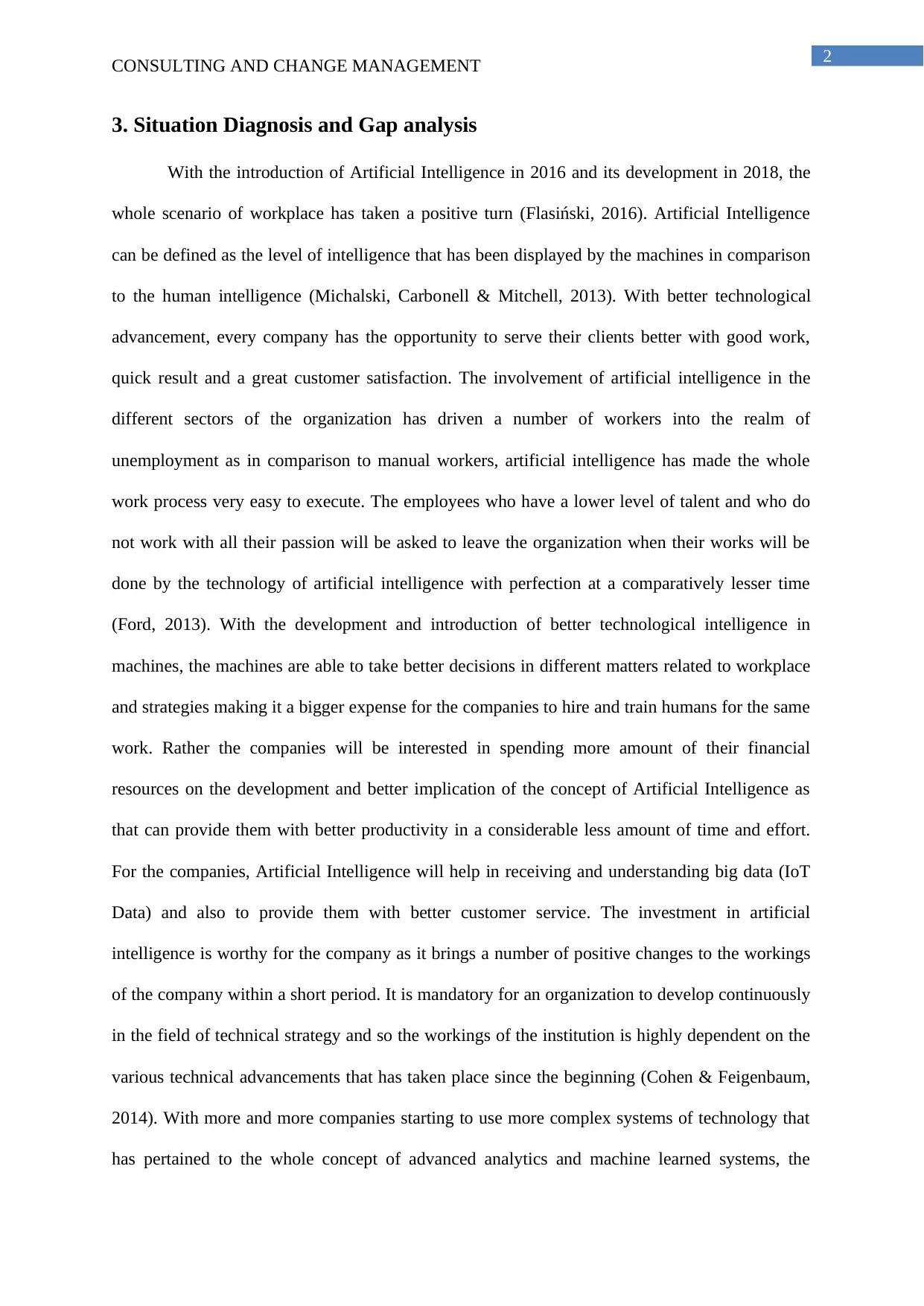
2
CONSULTING AND CHANGE MANAGEMENT
3. Situation Diagnosis and Gap analysis
With the introduction of Artificial Intelligence in 2016 and its development in 2018, the
whole scenario of workplace has taken a positive turn (Flasiński, 2016). Artificial Intelligence
can be defined as the level of intelligence that has been displayed by the machines in comparison
to the human intelligence (Michalski, Carbonell & Mitchell, 2013). With better technological
advancement, every company has the opportunity to serve their clients better with good work,
quick result and a great customer satisfaction. The involvement of artificial intelligence in the
different sectors of the organization has driven a number of workers into the realm of
unemployment as in comparison to manual workers, artificial intelligence has made the whole
work process very easy to execute. The employees who have a lower level of talent and who do
not work with all their passion will be asked to leave the organization when their works will be
done by the technology of artificial intelligence with perfection at a comparatively lesser time
(Ford, 2013). With the development and introduction of better technological intelligence in
machines, the machines are able to take better decisions in different matters related to workplace
and strategies making it a bigger expense for the companies to hire and train humans for the same
work. Rather the companies will be interested in spending more amount of their financial
resources on the development and better implication of the concept of Artificial Intelligence as
that can provide them with better productivity in a considerable less amount of time and effort.
For the companies, Artificial Intelligence will help in receiving and understanding big data (IoT
Data) and also to provide them with better customer service. The investment in artificial
intelligence is worthy for the company as it brings a number of positive changes to the workings
of the company within a short period. It is mandatory for an organization to develop continuously
in the field of technical strategy and so the workings of the institution is highly dependent on the
various technical advancements that has taken place since the beginning (Cohen & Feigenbaum,
2014). With more and more companies starting to use more complex systems of technology that
has pertained to the whole concept of advanced analytics and machine learned systems, the
CONSULTING AND CHANGE MANAGEMENT
3. Situation Diagnosis and Gap analysis
With the introduction of Artificial Intelligence in 2016 and its development in 2018, the
whole scenario of workplace has taken a positive turn (Flasiński, 2016). Artificial Intelligence
can be defined as the level of intelligence that has been displayed by the machines in comparison
to the human intelligence (Michalski, Carbonell & Mitchell, 2013). With better technological
advancement, every company has the opportunity to serve their clients better with good work,
quick result and a great customer satisfaction. The involvement of artificial intelligence in the
different sectors of the organization has driven a number of workers into the realm of
unemployment as in comparison to manual workers, artificial intelligence has made the whole
work process very easy to execute. The employees who have a lower level of talent and who do
not work with all their passion will be asked to leave the organization when their works will be
done by the technology of artificial intelligence with perfection at a comparatively lesser time
(Ford, 2013). With the development and introduction of better technological intelligence in
machines, the machines are able to take better decisions in different matters related to workplace
and strategies making it a bigger expense for the companies to hire and train humans for the same
work. Rather the companies will be interested in spending more amount of their financial
resources on the development and better implication of the concept of Artificial Intelligence as
that can provide them with better productivity in a considerable less amount of time and effort.
For the companies, Artificial Intelligence will help in receiving and understanding big data (IoT
Data) and also to provide them with better customer service. The investment in artificial
intelligence is worthy for the company as it brings a number of positive changes to the workings
of the company within a short period. It is mandatory for an organization to develop continuously
in the field of technical strategy and so the workings of the institution is highly dependent on the
various technical advancements that has taken place since the beginning (Cohen & Feigenbaum,
2014). With more and more companies starting to use more complex systems of technology that
has pertained to the whole concept of advanced analytics and machine learned systems, the
⊘ This is a preview!⊘
Do you want full access?
Subscribe today to unlock all pages.

Trusted by 1+ million students worldwide
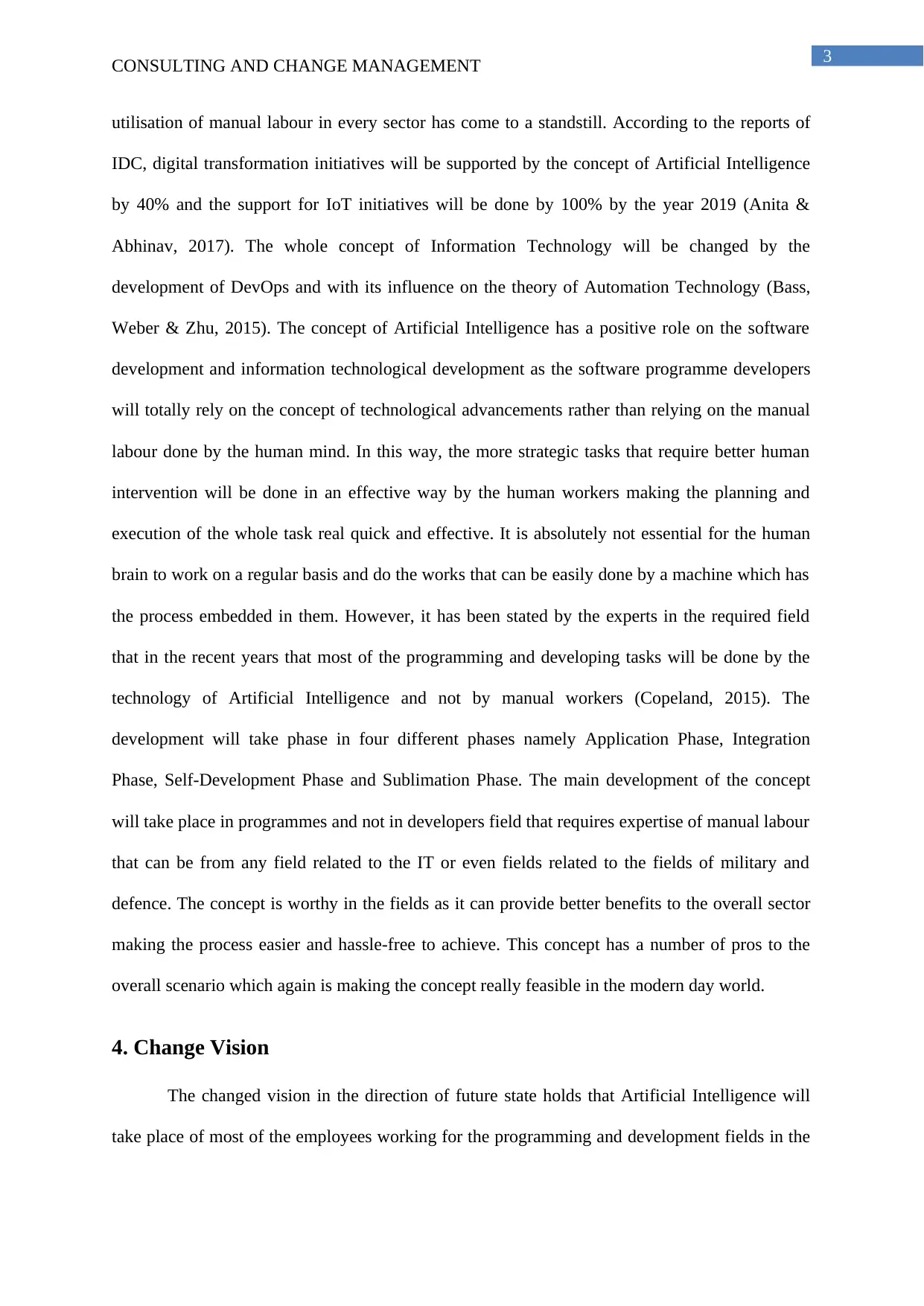
3
CONSULTING AND CHANGE MANAGEMENT
utilisation of manual labour in every sector has come to a standstill. According to the reports of
IDC, digital transformation initiatives will be supported by the concept of Artificial Intelligence
by 40% and the support for IoT initiatives will be done by 100% by the year 2019 (Anita &
Abhinav, 2017). The whole concept of Information Technology will be changed by the
development of DevOps and with its influence on the theory of Automation Technology (Bass,
Weber & Zhu, 2015). The concept of Artificial Intelligence has a positive role on the software
development and information technological development as the software programme developers
will totally rely on the concept of technological advancements rather than relying on the manual
labour done by the human mind. In this way, the more strategic tasks that require better human
intervention will be done in an effective way by the human workers making the planning and
execution of the whole task real quick and effective. It is absolutely not essential for the human
brain to work on a regular basis and do the works that can be easily done by a machine which has
the process embedded in them. However, it has been stated by the experts in the required field
that in the recent years that most of the programming and developing tasks will be done by the
technology of Artificial Intelligence and not by manual workers (Copeland, 2015). The
development will take phase in four different phases namely Application Phase, Integration
Phase, Self-Development Phase and Sublimation Phase. The main development of the concept
will take place in programmes and not in developers field that requires expertise of manual labour
that can be from any field related to the IT or even fields related to the fields of military and
defence. The concept is worthy in the fields as it can provide better benefits to the overall sector
making the process easier and hassle-free to achieve. This concept has a number of pros to the
overall scenario which again is making the concept really feasible in the modern day world.
4. Change Vision
The changed vision in the direction of future state holds that Artificial Intelligence will
take place of most of the employees working for the programming and development fields in the
CONSULTING AND CHANGE MANAGEMENT
utilisation of manual labour in every sector has come to a standstill. According to the reports of
IDC, digital transformation initiatives will be supported by the concept of Artificial Intelligence
by 40% and the support for IoT initiatives will be done by 100% by the year 2019 (Anita &
Abhinav, 2017). The whole concept of Information Technology will be changed by the
development of DevOps and with its influence on the theory of Automation Technology (Bass,
Weber & Zhu, 2015). The concept of Artificial Intelligence has a positive role on the software
development and information technological development as the software programme developers
will totally rely on the concept of technological advancements rather than relying on the manual
labour done by the human mind. In this way, the more strategic tasks that require better human
intervention will be done in an effective way by the human workers making the planning and
execution of the whole task real quick and effective. It is absolutely not essential for the human
brain to work on a regular basis and do the works that can be easily done by a machine which has
the process embedded in them. However, it has been stated by the experts in the required field
that in the recent years that most of the programming and developing tasks will be done by the
technology of Artificial Intelligence and not by manual workers (Copeland, 2015). The
development will take phase in four different phases namely Application Phase, Integration
Phase, Self-Development Phase and Sublimation Phase. The main development of the concept
will take place in programmes and not in developers field that requires expertise of manual labour
that can be from any field related to the IT or even fields related to the fields of military and
defence. The concept is worthy in the fields as it can provide better benefits to the overall sector
making the process easier and hassle-free to achieve. This concept has a number of pros to the
overall scenario which again is making the concept really feasible in the modern day world.
4. Change Vision
The changed vision in the direction of future state holds that Artificial Intelligence will
take place of most of the employees working for the programming and development fields in the
Paraphrase This Document
Need a fresh take? Get an instant paraphrase of this document with our AI Paraphraser
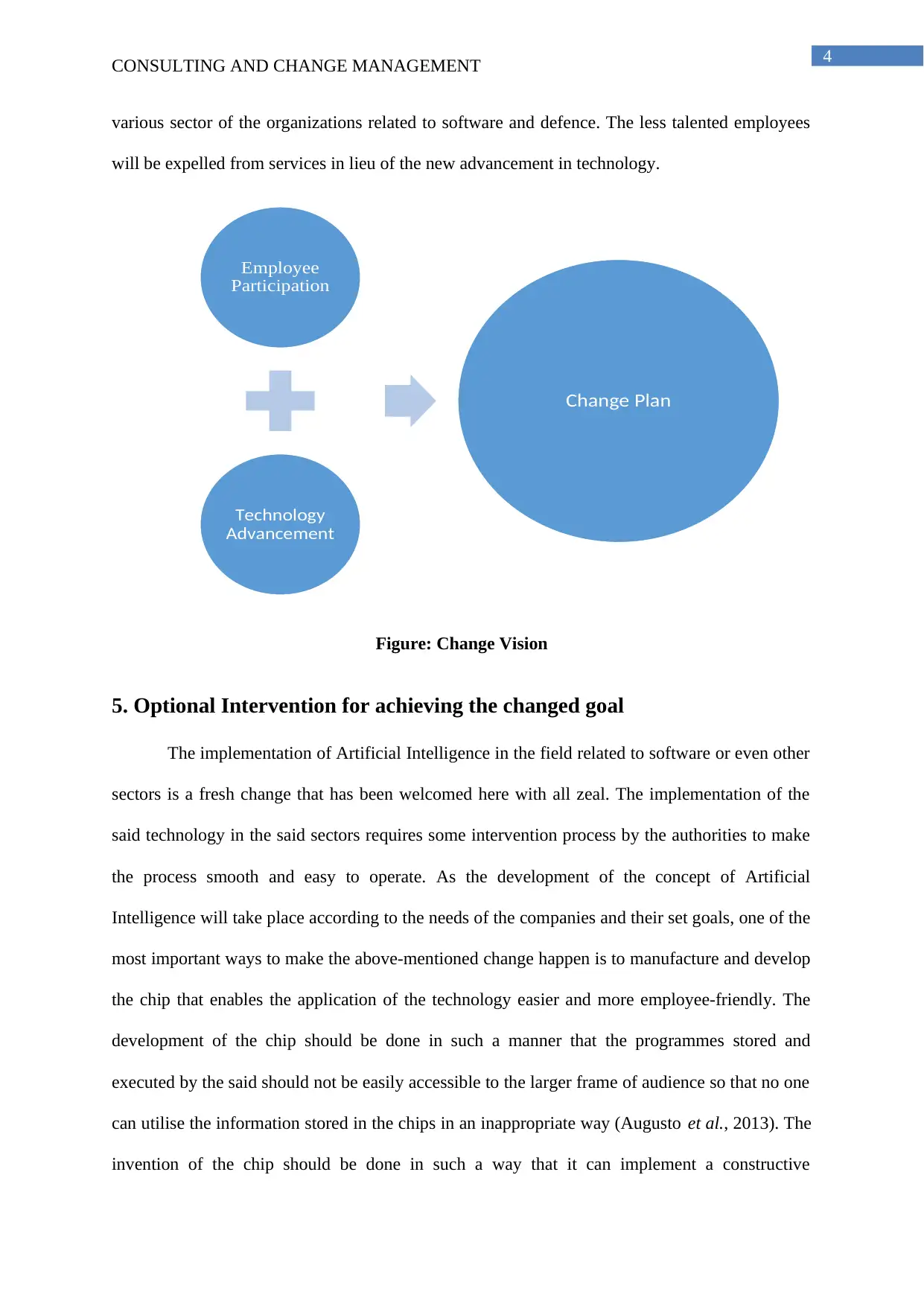
4
CONSULTING AND CHANGE MANAGEMENT
various sector of the organizations related to software and defence. The less talented employees
will be expelled from services in lieu of the new advancement in technology.
Figure: Change Vision
5. Optional Intervention for achieving the changed goal
The implementation of Artificial Intelligence in the field related to software or even other
sectors is a fresh change that has been welcomed here with all zeal. The implementation of the
said technology in the said sectors requires some intervention process by the authorities to make
the process smooth and easy to operate. As the development of the concept of Artificial
Intelligence will take place according to the needs of the companies and their set goals, one of the
most important ways to make the above-mentioned change happen is to manufacture and develop
the chip that enables the application of the technology easier and more employee-friendly. The
development of the chip should be done in such a manner that the programmes stored and
executed by the said should not be easily accessible to the larger frame of audience so that no one
can utilise the information stored in the chips in an inappropriate way (Augusto et al., 2013). The
invention of the chip should be done in such a way that it can implement a constructive
Employee
Participation
Technology
Advancement
Change Plan
CONSULTING AND CHANGE MANAGEMENT
various sector of the organizations related to software and defence. The less talented employees
will be expelled from services in lieu of the new advancement in technology.
Figure: Change Vision
5. Optional Intervention for achieving the changed goal
The implementation of Artificial Intelligence in the field related to software or even other
sectors is a fresh change that has been welcomed here with all zeal. The implementation of the
said technology in the said sectors requires some intervention process by the authorities to make
the process smooth and easy to operate. As the development of the concept of Artificial
Intelligence will take place according to the needs of the companies and their set goals, one of the
most important ways to make the above-mentioned change happen is to manufacture and develop
the chip that enables the application of the technology easier and more employee-friendly. The
development of the chip should be done in such a manner that the programmes stored and
executed by the said should not be easily accessible to the larger frame of audience so that no one
can utilise the information stored in the chips in an inappropriate way (Augusto et al., 2013). The
invention of the chip should be done in such a way that it can implement a constructive
Employee
Participation
Technology
Advancement
Change Plan
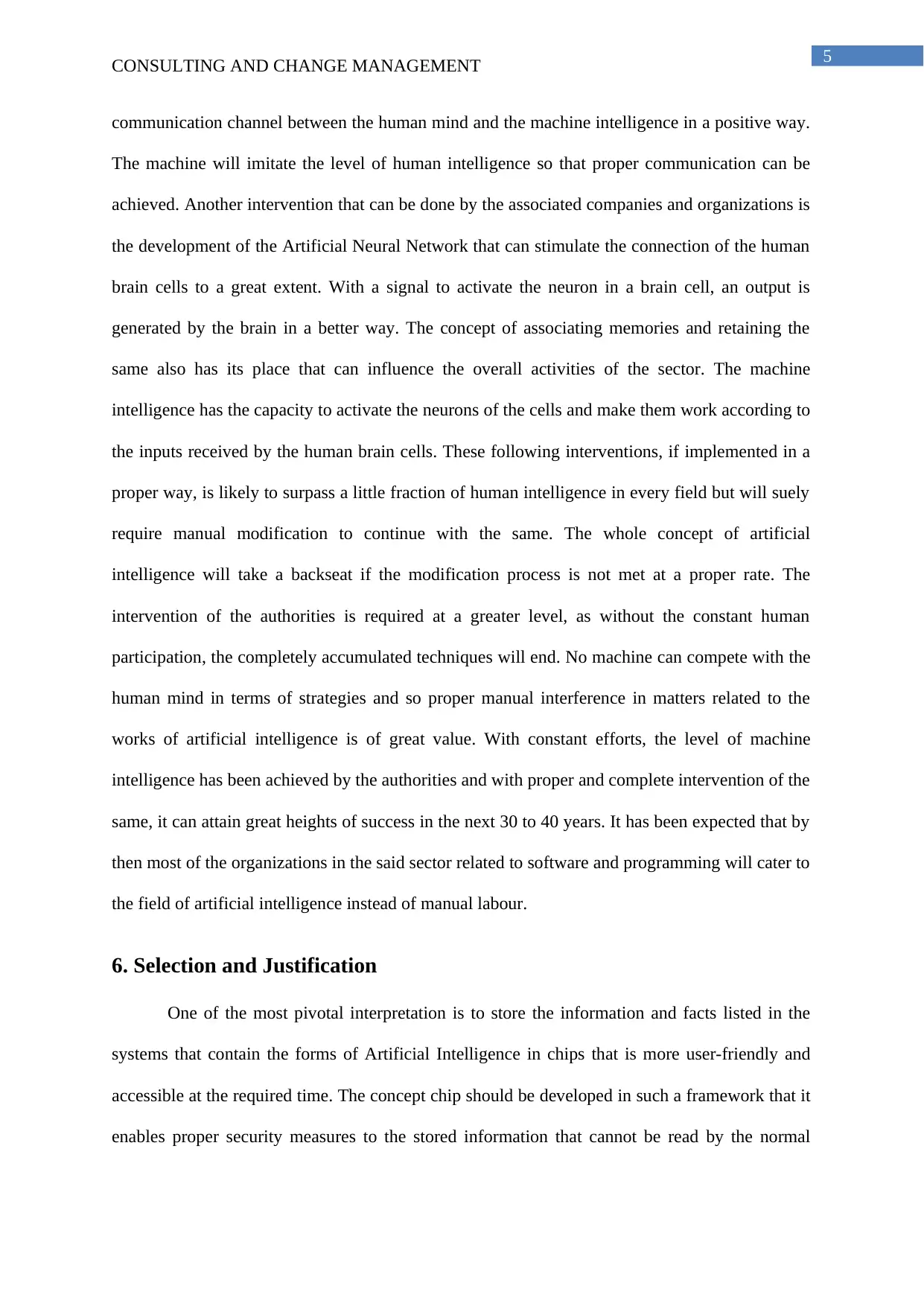
5
CONSULTING AND CHANGE MANAGEMENT
communication channel between the human mind and the machine intelligence in a positive way.
The machine will imitate the level of human intelligence so that proper communication can be
achieved. Another intervention that can be done by the associated companies and organizations is
the development of the Artificial Neural Network that can stimulate the connection of the human
brain cells to a great extent. With a signal to activate the neuron in a brain cell, an output is
generated by the brain in a better way. The concept of associating memories and retaining the
same also has its place that can influence the overall activities of the sector. The machine
intelligence has the capacity to activate the neurons of the cells and make them work according to
the inputs received by the human brain cells. These following interventions, if implemented in a
proper way, is likely to surpass a little fraction of human intelligence in every field but will suely
require manual modification to continue with the same. The whole concept of artificial
intelligence will take a backseat if the modification process is not met at a proper rate. The
intervention of the authorities is required at a greater level, as without the constant human
participation, the completely accumulated techniques will end. No machine can compete with the
human mind in terms of strategies and so proper manual interference in matters related to the
works of artificial intelligence is of great value. With constant efforts, the level of machine
intelligence has been achieved by the authorities and with proper and complete intervention of the
same, it can attain great heights of success in the next 30 to 40 years. It has been expected that by
then most of the organizations in the said sector related to software and programming will cater to
the field of artificial intelligence instead of manual labour.
6. Selection and Justification
One of the most pivotal interpretation is to store the information and facts listed in the
systems that contain the forms of Artificial Intelligence in chips that is more user-friendly and
accessible at the required time. The concept chip should be developed in such a framework that it
enables proper security measures to the stored information that cannot be read by the normal
CONSULTING AND CHANGE MANAGEMENT
communication channel between the human mind and the machine intelligence in a positive way.
The machine will imitate the level of human intelligence so that proper communication can be
achieved. Another intervention that can be done by the associated companies and organizations is
the development of the Artificial Neural Network that can stimulate the connection of the human
brain cells to a great extent. With a signal to activate the neuron in a brain cell, an output is
generated by the brain in a better way. The concept of associating memories and retaining the
same also has its place that can influence the overall activities of the sector. The machine
intelligence has the capacity to activate the neurons of the cells and make them work according to
the inputs received by the human brain cells. These following interventions, if implemented in a
proper way, is likely to surpass a little fraction of human intelligence in every field but will suely
require manual modification to continue with the same. The whole concept of artificial
intelligence will take a backseat if the modification process is not met at a proper rate. The
intervention of the authorities is required at a greater level, as without the constant human
participation, the completely accumulated techniques will end. No machine can compete with the
human mind in terms of strategies and so proper manual interference in matters related to the
works of artificial intelligence is of great value. With constant efforts, the level of machine
intelligence has been achieved by the authorities and with proper and complete intervention of the
same, it can attain great heights of success in the next 30 to 40 years. It has been expected that by
then most of the organizations in the said sector related to software and programming will cater to
the field of artificial intelligence instead of manual labour.
6. Selection and Justification
One of the most pivotal interpretation is to store the information and facts listed in the
systems that contain the forms of Artificial Intelligence in chips that is more user-friendly and
accessible at the required time. The concept chip should be developed in such a framework that it
enables proper security measures to the stored information that cannot be read by the normal
⊘ This is a preview!⊘
Do you want full access?
Subscribe today to unlock all pages.

Trusted by 1+ million students worldwide
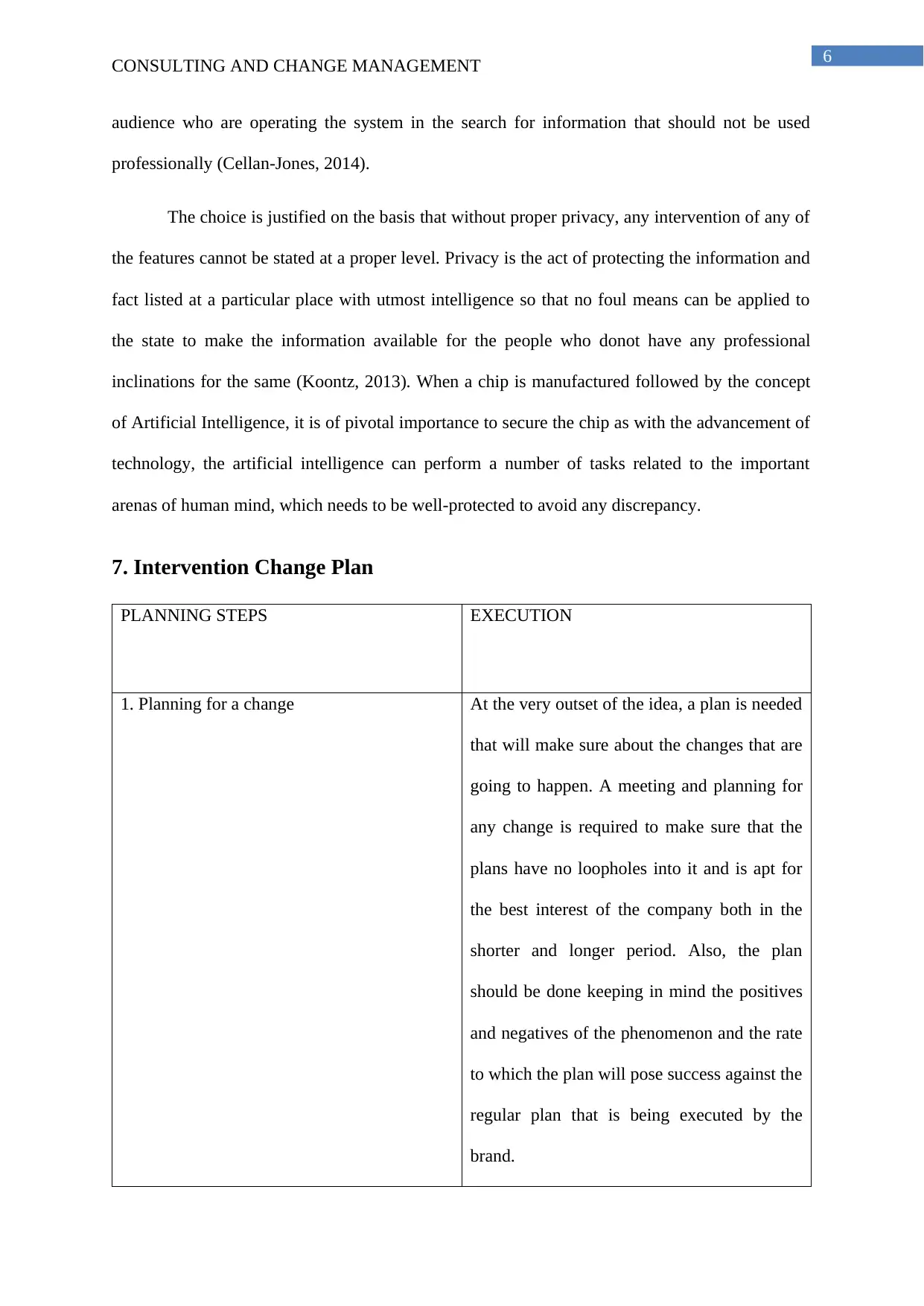
6
CONSULTING AND CHANGE MANAGEMENT
audience who are operating the system in the search for information that should not be used
professionally (Cellan-Jones, 2014).
The choice is justified on the basis that without proper privacy, any intervention of any of
the features cannot be stated at a proper level. Privacy is the act of protecting the information and
fact listed at a particular place with utmost intelligence so that no foul means can be applied to
the state to make the information available for the people who donot have any professional
inclinations for the same (Koontz, 2013). When a chip is manufactured followed by the concept
of Artificial Intelligence, it is of pivotal importance to secure the chip as with the advancement of
technology, the artificial intelligence can perform a number of tasks related to the important
arenas of human mind, which needs to be well-protected to avoid any discrepancy.
7. Intervention Change Plan
PLANNING STEPS EXECUTION
1. Planning for a change At the very outset of the idea, a plan is needed
that will make sure about the changes that are
going to happen. A meeting and planning for
any change is required to make sure that the
plans have no loopholes into it and is apt for
the best interest of the company both in the
shorter and longer period. Also, the plan
should be done keeping in mind the positives
and negatives of the phenomenon and the rate
to which the plan will pose success against the
regular plan that is being executed by the
brand.
CONSULTING AND CHANGE MANAGEMENT
audience who are operating the system in the search for information that should not be used
professionally (Cellan-Jones, 2014).
The choice is justified on the basis that without proper privacy, any intervention of any of
the features cannot be stated at a proper level. Privacy is the act of protecting the information and
fact listed at a particular place with utmost intelligence so that no foul means can be applied to
the state to make the information available for the people who donot have any professional
inclinations for the same (Koontz, 2013). When a chip is manufactured followed by the concept
of Artificial Intelligence, it is of pivotal importance to secure the chip as with the advancement of
technology, the artificial intelligence can perform a number of tasks related to the important
arenas of human mind, which needs to be well-protected to avoid any discrepancy.
7. Intervention Change Plan
PLANNING STEPS EXECUTION
1. Planning for a change At the very outset of the idea, a plan is needed
that will make sure about the changes that are
going to happen. A meeting and planning for
any change is required to make sure that the
plans have no loopholes into it and is apt for
the best interest of the company both in the
shorter and longer period. Also, the plan
should be done keeping in mind the positives
and negatives of the phenomenon and the rate
to which the plan will pose success against the
regular plan that is being executed by the
brand.
Paraphrase This Document
Need a fresh take? Get an instant paraphrase of this document with our AI Paraphraser
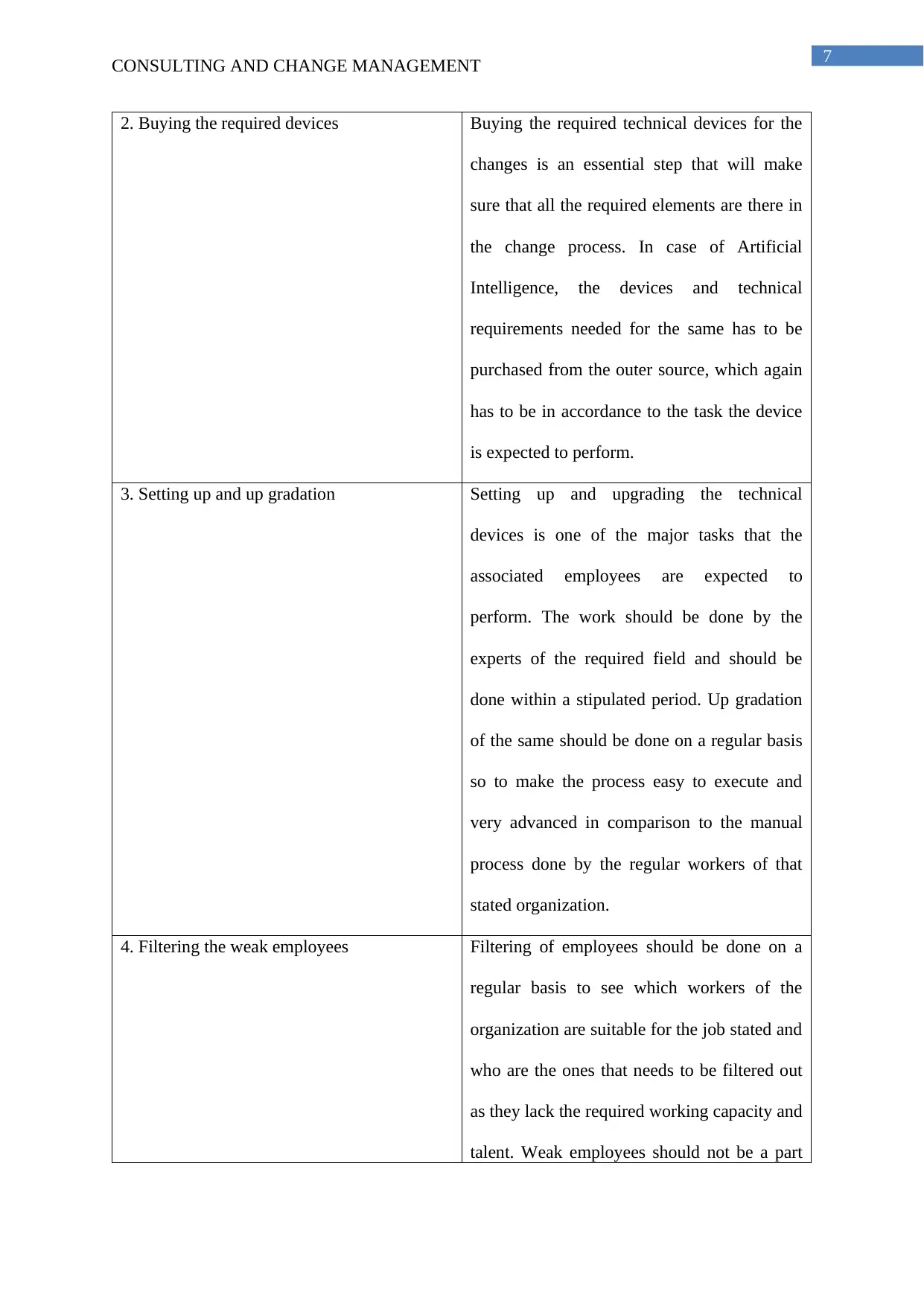
7
CONSULTING AND CHANGE MANAGEMENT
2. Buying the required devices Buying the required technical devices for the
changes is an essential step that will make
sure that all the required elements are there in
the change process. In case of Artificial
Intelligence, the devices and technical
requirements needed for the same has to be
purchased from the outer source, which again
has to be in accordance to the task the device
is expected to perform.
3. Setting up and up gradation Setting up and upgrading the technical
devices is one of the major tasks that the
associated employees are expected to
perform. The work should be done by the
experts of the required field and should be
done within a stipulated period. Up gradation
of the same should be done on a regular basis
so to make the process easy to execute and
very advanced in comparison to the manual
process done by the regular workers of that
stated organization.
4. Filtering the weak employees Filtering of employees should be done on a
regular basis to see which workers of the
organization are suitable for the job stated and
who are the ones that needs to be filtered out
as they lack the required working capacity and
talent. Weak employees should not be a part
CONSULTING AND CHANGE MANAGEMENT
2. Buying the required devices Buying the required technical devices for the
changes is an essential step that will make
sure that all the required elements are there in
the change process. In case of Artificial
Intelligence, the devices and technical
requirements needed for the same has to be
purchased from the outer source, which again
has to be in accordance to the task the device
is expected to perform.
3. Setting up and up gradation Setting up and upgrading the technical
devices is one of the major tasks that the
associated employees are expected to
perform. The work should be done by the
experts of the required field and should be
done within a stipulated period. Up gradation
of the same should be done on a regular basis
so to make the process easy to execute and
very advanced in comparison to the manual
process done by the regular workers of that
stated organization.
4. Filtering the weak employees Filtering of employees should be done on a
regular basis to see which workers of the
organization are suitable for the job stated and
who are the ones that needs to be filtered out
as they lack the required working capacity and
talent. Weak employees should not be a part
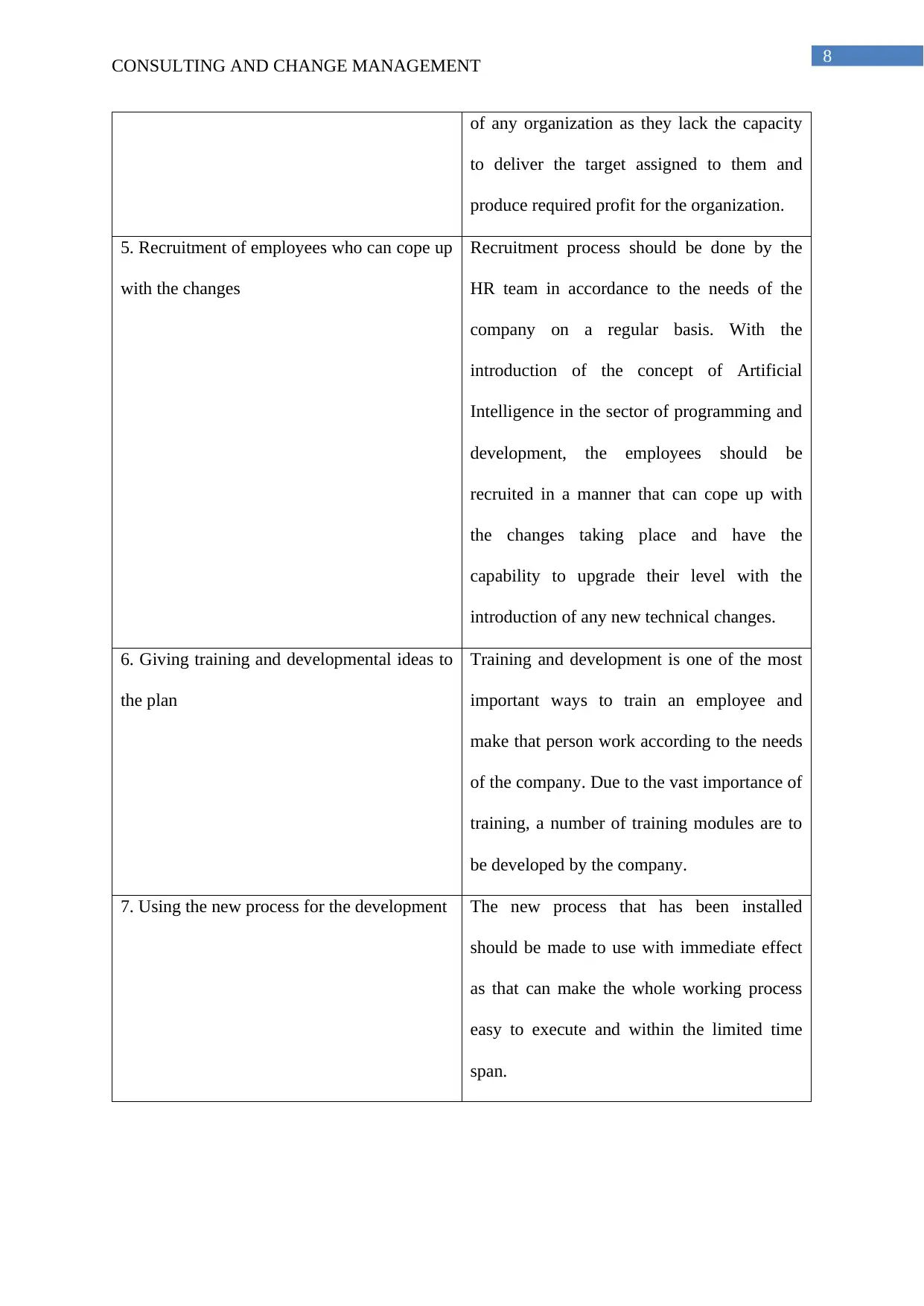
8
CONSULTING AND CHANGE MANAGEMENT
of any organization as they lack the capacity
to deliver the target assigned to them and
produce required profit for the organization.
5. Recruitment of employees who can cope up
with the changes
Recruitment process should be done by the
HR team in accordance to the needs of the
company on a regular basis. With the
introduction of the concept of Artificial
Intelligence in the sector of programming and
development, the employees should be
recruited in a manner that can cope up with
the changes taking place and have the
capability to upgrade their level with the
introduction of any new technical changes.
6. Giving training and developmental ideas to
the plan
Training and development is one of the most
important ways to train an employee and
make that person work according to the needs
of the company. Due to the vast importance of
training, a number of training modules are to
be developed by the company.
7. Using the new process for the development The new process that has been installed
should be made to use with immediate effect
as that can make the whole working process
easy to execute and within the limited time
span.
CONSULTING AND CHANGE MANAGEMENT
of any organization as they lack the capacity
to deliver the target assigned to them and
produce required profit for the organization.
5. Recruitment of employees who can cope up
with the changes
Recruitment process should be done by the
HR team in accordance to the needs of the
company on a regular basis. With the
introduction of the concept of Artificial
Intelligence in the sector of programming and
development, the employees should be
recruited in a manner that can cope up with
the changes taking place and have the
capability to upgrade their level with the
introduction of any new technical changes.
6. Giving training and developmental ideas to
the plan
Training and development is one of the most
important ways to train an employee and
make that person work according to the needs
of the company. Due to the vast importance of
training, a number of training modules are to
be developed by the company.
7. Using the new process for the development The new process that has been installed
should be made to use with immediate effect
as that can make the whole working process
easy to execute and within the limited time
span.
⊘ This is a preview!⊘
Do you want full access?
Subscribe today to unlock all pages.

Trusted by 1+ million students worldwide
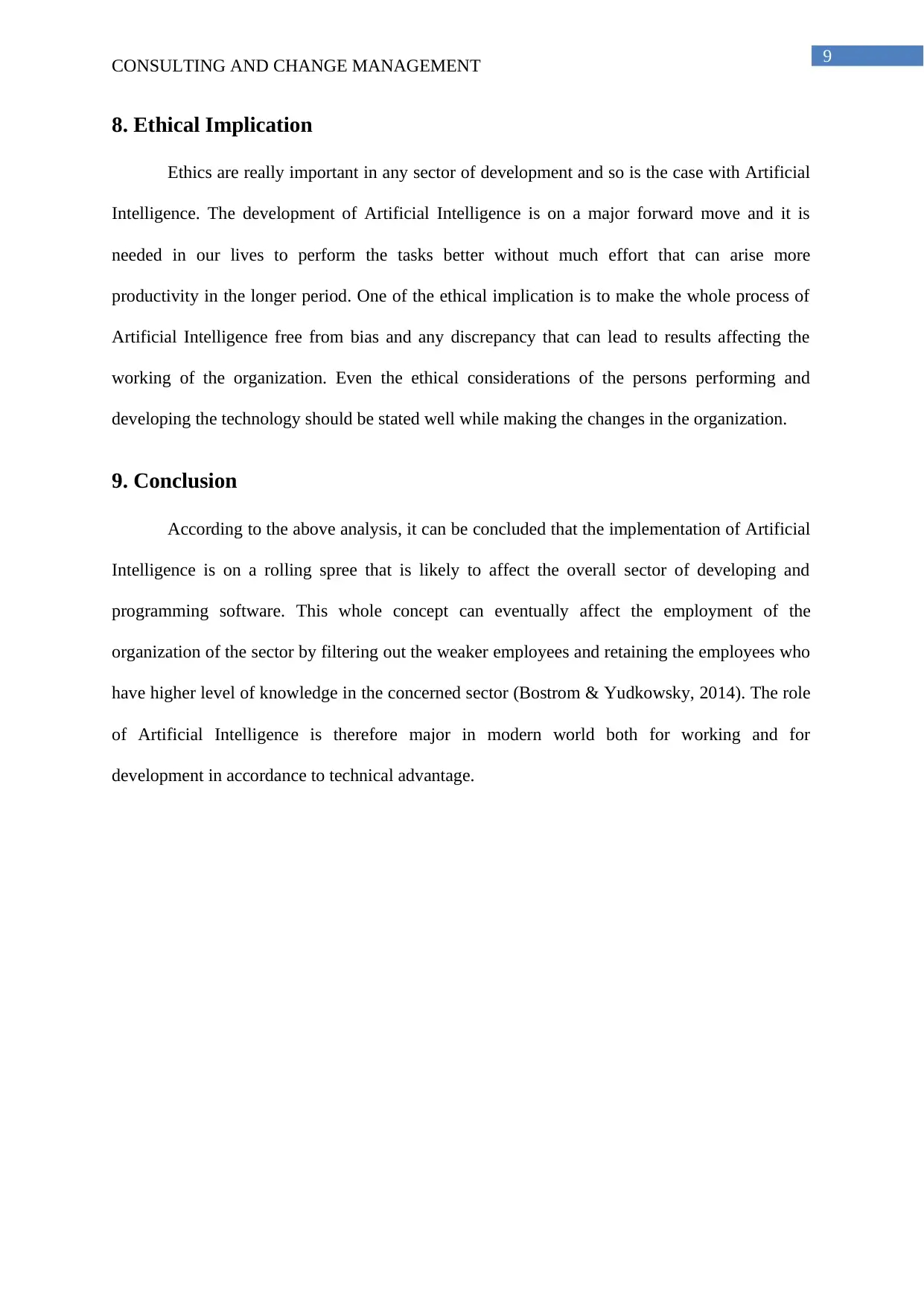
9
CONSULTING AND CHANGE MANAGEMENT
8. Ethical Implication
Ethics are really important in any sector of development and so is the case with Artificial
Intelligence. The development of Artificial Intelligence is on a major forward move and it is
needed in our lives to perform the tasks better without much effort that can arise more
productivity in the longer period. One of the ethical implication is to make the whole process of
Artificial Intelligence free from bias and any discrepancy that can lead to results affecting the
working of the organization. Even the ethical considerations of the persons performing and
developing the technology should be stated well while making the changes in the organization.
9. Conclusion
According to the above analysis, it can be concluded that the implementation of Artificial
Intelligence is on a rolling spree that is likely to affect the overall sector of developing and
programming software. This whole concept can eventually affect the employment of the
organization of the sector by filtering out the weaker employees and retaining the employees who
have higher level of knowledge in the concerned sector (Bostrom & Yudkowsky, 2014). The role
of Artificial Intelligence is therefore major in modern world both for working and for
development in accordance to technical advantage.
CONSULTING AND CHANGE MANAGEMENT
8. Ethical Implication
Ethics are really important in any sector of development and so is the case with Artificial
Intelligence. The development of Artificial Intelligence is on a major forward move and it is
needed in our lives to perform the tasks better without much effort that can arise more
productivity in the longer period. One of the ethical implication is to make the whole process of
Artificial Intelligence free from bias and any discrepancy that can lead to results affecting the
working of the organization. Even the ethical considerations of the persons performing and
developing the technology should be stated well while making the changes in the organization.
9. Conclusion
According to the above analysis, it can be concluded that the implementation of Artificial
Intelligence is on a rolling spree that is likely to affect the overall sector of developing and
programming software. This whole concept can eventually affect the employment of the
organization of the sector by filtering out the weaker employees and retaining the employees who
have higher level of knowledge in the concerned sector (Bostrom & Yudkowsky, 2014). The role
of Artificial Intelligence is therefore major in modern world both for working and for
development in accordance to technical advantage.
Paraphrase This Document
Need a fresh take? Get an instant paraphrase of this document with our AI Paraphraser
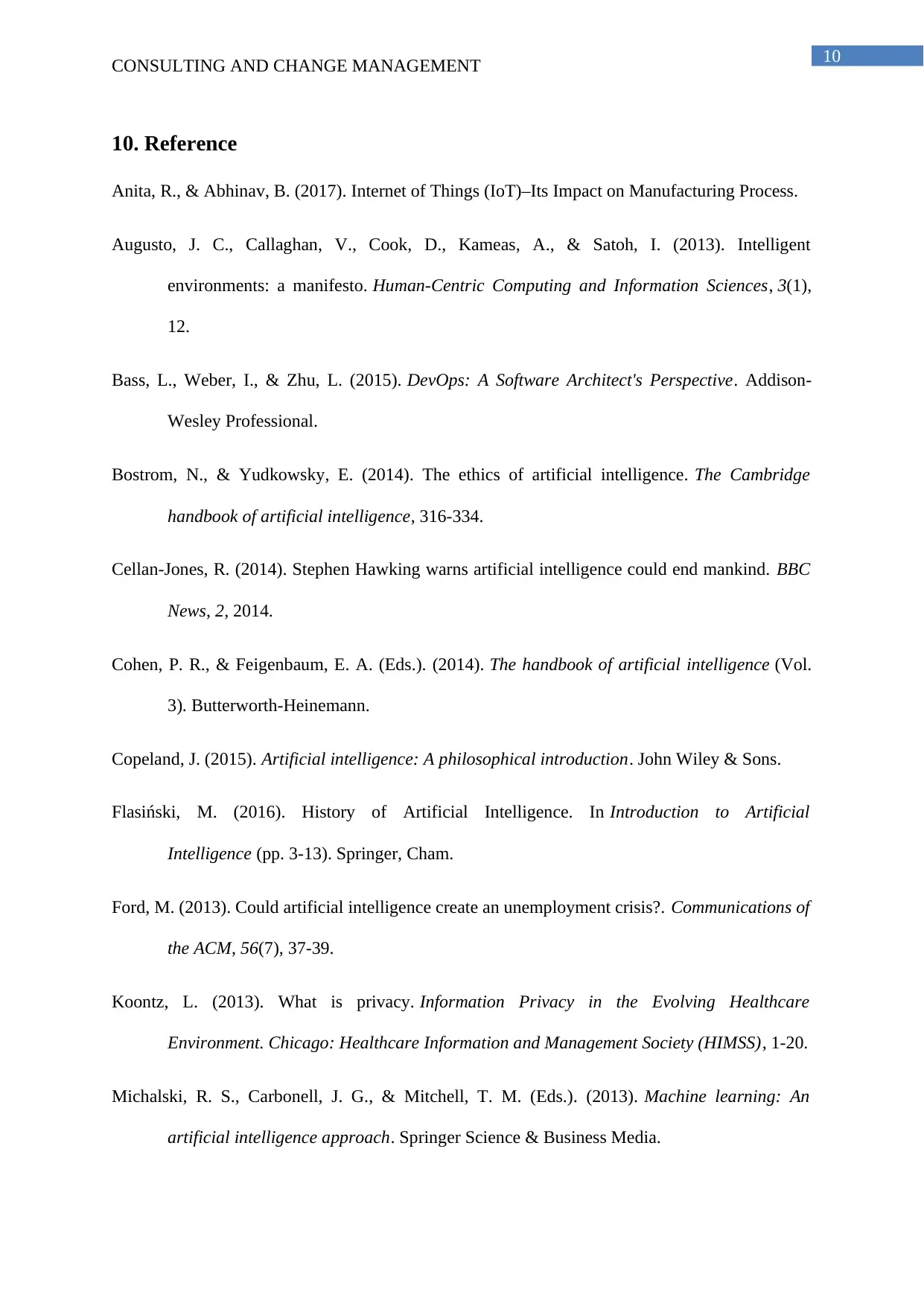
10
CONSULTING AND CHANGE MANAGEMENT
10. Reference
Anita, R., & Abhinav, B. (2017). Internet of Things (IoT)–Its Impact on Manufacturing Process.
Augusto, J. C., Callaghan, V., Cook, D., Kameas, A., & Satoh, I. (2013). Intelligent
environments: a manifesto. Human-Centric Computing and Information Sciences, 3(1),
12.
Bass, L., Weber, I., & Zhu, L. (2015). DevOps: A Software Architect's Perspective. Addison-
Wesley Professional.
Bostrom, N., & Yudkowsky, E. (2014). The ethics of artificial intelligence. The Cambridge
handbook of artificial intelligence, 316-334.
Cellan-Jones, R. (2014). Stephen Hawking warns artificial intelligence could end mankind. BBC
News, 2, 2014.
Cohen, P. R., & Feigenbaum, E. A. (Eds.). (2014). The handbook of artificial intelligence (Vol.
3). Butterworth-Heinemann.
Copeland, J. (2015). Artificial intelligence: A philosophical introduction. John Wiley & Sons.
Flasiński, M. (2016). History of Artificial Intelligence. In Introduction to Artificial
Intelligence (pp. 3-13). Springer, Cham.
Ford, M. (2013). Could artificial intelligence create an unemployment crisis?. Communications of
the ACM, 56(7), 37-39.
Koontz, L. (2013). What is privacy. Information Privacy in the Evolving Healthcare
Environment. Chicago: Healthcare Information and Management Society (HIMSS), 1-20.
Michalski, R. S., Carbonell, J. G., & Mitchell, T. M. (Eds.). (2013). Machine learning: An
artificial intelligence approach. Springer Science & Business Media.
CONSULTING AND CHANGE MANAGEMENT
10. Reference
Anita, R., & Abhinav, B. (2017). Internet of Things (IoT)–Its Impact on Manufacturing Process.
Augusto, J. C., Callaghan, V., Cook, D., Kameas, A., & Satoh, I. (2013). Intelligent
environments: a manifesto. Human-Centric Computing and Information Sciences, 3(1),
12.
Bass, L., Weber, I., & Zhu, L. (2015). DevOps: A Software Architect's Perspective. Addison-
Wesley Professional.
Bostrom, N., & Yudkowsky, E. (2014). The ethics of artificial intelligence. The Cambridge
handbook of artificial intelligence, 316-334.
Cellan-Jones, R. (2014). Stephen Hawking warns artificial intelligence could end mankind. BBC
News, 2, 2014.
Cohen, P. R., & Feigenbaum, E. A. (Eds.). (2014). The handbook of artificial intelligence (Vol.
3). Butterworth-Heinemann.
Copeland, J. (2015). Artificial intelligence: A philosophical introduction. John Wiley & Sons.
Flasiński, M. (2016). History of Artificial Intelligence. In Introduction to Artificial
Intelligence (pp. 3-13). Springer, Cham.
Ford, M. (2013). Could artificial intelligence create an unemployment crisis?. Communications of
the ACM, 56(7), 37-39.
Koontz, L. (2013). What is privacy. Information Privacy in the Evolving Healthcare
Environment. Chicago: Healthcare Information and Management Society (HIMSS), 1-20.
Michalski, R. S., Carbonell, J. G., & Mitchell, T. M. (Eds.). (2013). Machine learning: An
artificial intelligence approach. Springer Science & Business Media.
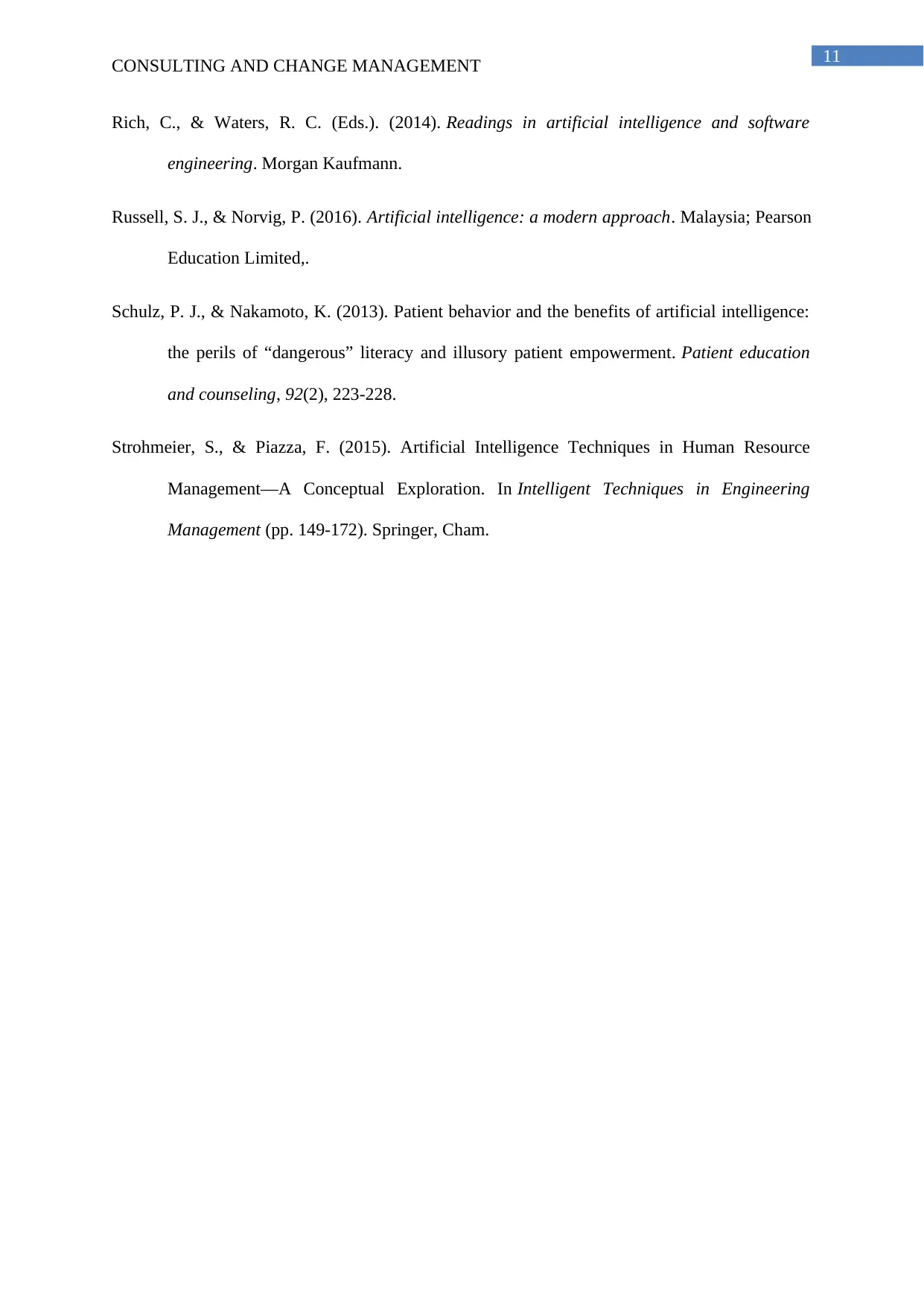
11
CONSULTING AND CHANGE MANAGEMENT
Rich, C., & Waters, R. C. (Eds.). (2014). Readings in artificial intelligence and software
engineering. Morgan Kaufmann.
Russell, S. J., & Norvig, P. (2016). Artificial intelligence: a modern approach. Malaysia; Pearson
Education Limited,.
Schulz, P. J., & Nakamoto, K. (2013). Patient behavior and the benefits of artificial intelligence:
the perils of “dangerous” literacy and illusory patient empowerment. Patient education
and counseling, 92(2), 223-228.
Strohmeier, S., & Piazza, F. (2015). Artificial Intelligence Techniques in Human Resource
Management—A Conceptual Exploration. In Intelligent Techniques in Engineering
Management (pp. 149-172). Springer, Cham.
CONSULTING AND CHANGE MANAGEMENT
Rich, C., & Waters, R. C. (Eds.). (2014). Readings in artificial intelligence and software
engineering. Morgan Kaufmann.
Russell, S. J., & Norvig, P. (2016). Artificial intelligence: a modern approach. Malaysia; Pearson
Education Limited,.
Schulz, P. J., & Nakamoto, K. (2013). Patient behavior and the benefits of artificial intelligence:
the perils of “dangerous” literacy and illusory patient empowerment. Patient education
and counseling, 92(2), 223-228.
Strohmeier, S., & Piazza, F. (2015). Artificial Intelligence Techniques in Human Resource
Management—A Conceptual Exploration. In Intelligent Techniques in Engineering
Management (pp. 149-172). Springer, Cham.
⊘ This is a preview!⊘
Do you want full access?
Subscribe today to unlock all pages.

Trusted by 1+ million students worldwide
1 out of 12
Related Documents
Your All-in-One AI-Powered Toolkit for Academic Success.
+13062052269
info@desklib.com
Available 24*7 on WhatsApp / Email
![[object Object]](/_next/static/media/star-bottom.7253800d.svg)
Unlock your academic potential
Copyright © 2020–2026 A2Z Services. All Rights Reserved. Developed and managed by ZUCOL.




